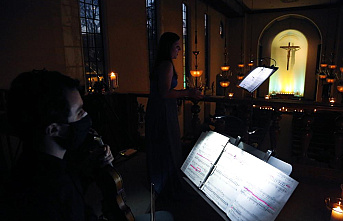She decided to go to Harvard, and eventually become president.
Although her memories of nine years ago are fuzzy, she recalls everyone around her pointing out Barack and Michelle Obama as the power couple at the moment and how few Black leaders, particularly Black women, she had learned about in school.
Bofah stated that he didn't know of any influential Black people who had attended Ivy League schools or other elite schools at that time. He was my idol at that time. I wanted to be a role model for other young girls who are like me.
Bofah, now 17, has switched her focus from the presidency to law school. The Charlotte teenager, North Carolina native, is interested in representing vulnerable people such as children and immigrants who have difficulty navigating the legal system. It was both inspiring and affirming to see Ketanji Jackson, a Black woman who served as a public defender and was nominated for the Supreme Court.
"Having someone who understands what it's like for clients who are disabled in the system... Bofah stated that she believes this is what makes her stand out.
Jackson's potential to be the first Black woman on America's Supreme Court is a moment for Black girls. It represents hope, promise, and breaking another barrier. While the symbolism is powerful, many want to see more than just representation.
Rachel McBride (18-year-old high-school senior from Atlanta) compared the moment to a glass elevator rather than a glass ceiling. She described the moment as moving one level higher, but also keeping her eyes open for the many levels that lie ahead.
McBride stated, "It's great being the first, but it's not something you want to do." McBride said that one person cannot make a difference. This must be followed up by more people who are open to making changes."
McBride stated that when barriers are broken it is often followed up by backlash, or a feeling among marginalized communities that they should just accept the symbolism. McBride stated that Jackson would be an excellent addition to the court's courtroom, but she also said that it would not change the balance of court if Jackson was confirmed.
Some have already tried to undermine Jackson's nomination by calling it affirmative action and discrimination against white people. It will be closely watched whether this strategy continues Monday's Senate hearing.
McBride stated that those who believe this are not seeing the unimpeachable achievements of Jackson, ranging from her Ivy League degree to her time on the bench.
McBride stated that it brought back memories of a camp for media studies at University of Georgia. McBride claimed she did twice as much work as her classmates, but was still accused by the instructor of being lazy.
McBride stated that being Black, and specifically Black women, can be very stressful.
Black girls will be reminded that success does not require them to shrink. Jackson is an example of this. Her hairstyle, darker skin, and her name are all a reflection of her Blackness.
Breana Fowler (17-year-old Charlotte high school senior) said that her mother used jokes about her becoming the first Black woman Supreme Court justice. It is surreal to see the moment before either of them could, with Jackson as the judge.
Fowler stated, "She wears it loud and proud." Fowler said that brown-skinned or dark-skinned girls often get ridiculed for their intelligence and looks. It was important for her to feel confident, to look like her and to be a Supreme Court nominee. I believe that a lot of Black girls understood that. I know that I did.
Tamara Morgan (18-year-old high school senior in Atlanta) said that black women are often told that their natural hair is not professional. She said that their natural appearances are used against them and taken away from their qualifications.
Morgan is so grateful to see Black women in leadership that embrace their identities. It's like looking in a mirror to see yourself and what's possible.
Morgan stated, "When I look at women such as Stacey Abrams or Ms. Jackson I feel like there's room for me in this world and a lot more women who look like us." Democrat Abrams will be running for Georgia governor in 2022.
Jackson spoke out for the first time after being nominated. Jackson said that if confirmed, she hopes her "life, career, love of the Constitution, and my dedication to upholding the rule law and the sacred principles on which this great country was founded will inspire future generations."
Jackson is an example for many girls because of her track record and career that led to her nomination.
Sidney Griffin (16 years old) is a Charlotte junior who participated in youth advocacy campaigns, including one for diversity in school curriculum. Sidney also advocated for tuition equity for students who are covered under the Deferred Action for Childhood Arrivals program. She said that this moment inspired her to dream bigger.
She said, "She's certainly inspiring me to continue creating change in my community." It also makes me wonder what I can do more to make a difference in Charlotte and North Carolina, as well as America. She inspires little girls all over the world and teens like me to continue fighting for change and diversifying the people in power, who make decisions that will affect us today and generations to come.











